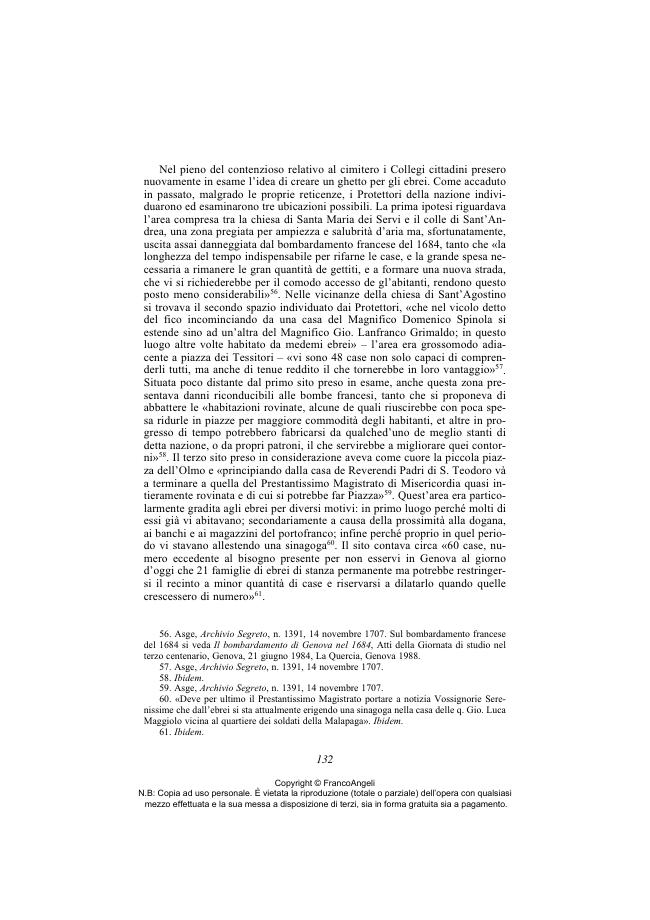Inserire una minoranza nello spazio cittadino : il caso della comunità ebraica di Genova (1658-1737)
119-145 p.
Il presente studio si propone di ripercorrere le vicende relative alla comunita ebraica genovese, specie nel suo rapporto con gli spazi cittadini, negli anni compresi tra i primi Capitoli della nazione ebrea concessi nel 1658 e l'ultima espulsione dalla citta, decretata nel 1737 e concretizzatasi sei anni dopo. Conseguentemente all'arrivo a Genova di un certo numero di ebrei, nell'agenda politica del patriziato si impose la questione del ghetto, che richiedeva lo studio di soluzioni di natura urbanistica ma che d'altra parte presentava ricadute sociali, economiche e culturali da valutare con grande attenzione. Lo smantellamento dei cancelli del ghetto avvenuto nel 1679, e la collocazione degli ebrei nel tessuto urbano, rendeva necessario ripensare la convivenza tra la popolazione autoctona e questa minoranza.
Il mancato raggiungimento dell'equilibrio, le difficolta legate all'individuazione di una nuova area per l'erezione di un nuovo ghetto, oltre al definitivo tramonto dell'idea di riattivare un imponente traffico commerciale con il Levante, furono i motivi che causarono nel 1737 la revoca dei Capitoli e la conseguente cacciata degli ebrei dalla citta. [Testo dell'editore].
The article aims to retrace the events relating to the Genoese Jewish community, especially in its relationship with city spaces, in the years between the first Chapters of the Jewish nation granted in 1658 and the last expulsion from the city, decreed in 1737 and materialized six years later. Consequently to the arrival in Genoa of a certain number of Jews, the question of the ghetto arose on the political agenda of the patrician, a practice that required the study of urban planning solutions but which, on the other hand, had social, economic and cultural impact to be evaluated with great attention. The dismantling of the ghetto gates in 1679, and the placement of the Jews in the urban fabric, made it necessary to rethink the coexistence between the indigenous population and this minority.
The failure to achieve balance, the difficulties associated with identifying a new area for the erection of a new ghetto, in addition to the definitive decline of the idea of reactivating a relevant commercial traffic with the Levant, were the reasons that caused in 1737 the revocation of the Chapters and the consequent expulsion of the Jews from the city. [Publisher's text].
Forma parte de
Storia urbana : rivista di studi sulle trasformazioni della città e del territorio in età moderna : 167, 3, 2020-
Artículos del mismo número (disponibles individualmente)
-
Información
Código DOI: 10.3280/SU2020-167007
ISSN: 1972-5523
MATERIAS
KEYWORDS
- Ebrei, Genova, ghetto, portofranco, commercio, Mediterraneo 150.
- Jews, Genoa, ghetto, freeport, commerce, Mediterranean



